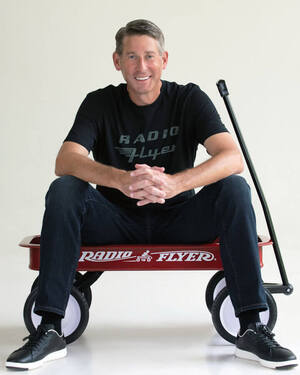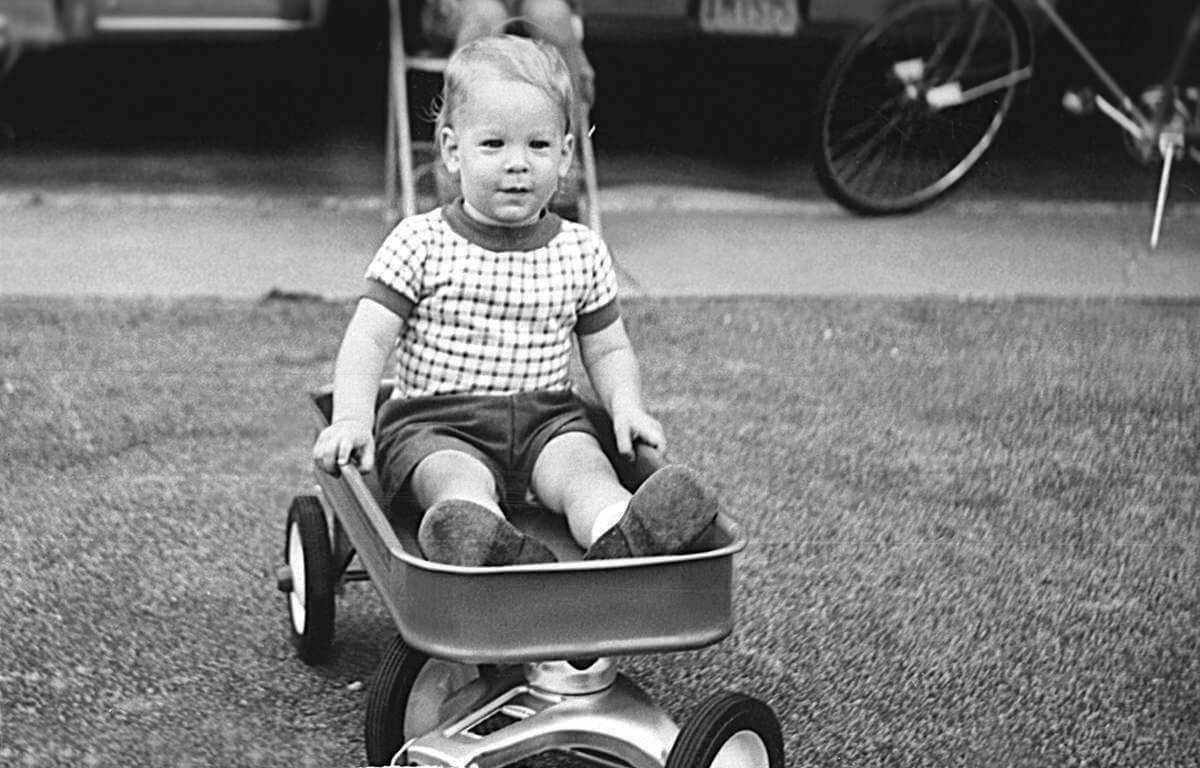
Holding his father’s big hand, Robert Pasin walked around the Radio Flyer factory for the first time when he was 5 — starry-eyed, like a kid at Disney World.
“Hearing the sound of the punch presses and the smell of the paint, and seeing all these wagons on a conveyor line,” Pasin ’91 says today. “It just seemed very magical to me.”
A grandson of the company’s founder, Pasin has run Radio Flyer since 1997 as its “Chief Wagon Officer.” He had worked summers at the company during high school and college, learning all he could about its products — the Classic Red Wagon and other toys for kids to ride. With the support of his father, Mario ’53, ’54J.D., and brother, Paul ’89J.D., Robert became president at age 28. He felt he had been handed a gift.
“For me, it’s really kind of a love story,” he says.
The love story began in 1913 when 16-year-old Antonio Pasin emigrated from Venice, Italy, to Chicago, working a variety of day-labor jobs alongside other immigrants. Saving money to rent a one-room workshop on Chicago’s west side, he built and sold wooden “Liberty Coaster” wagons. By 1927, the operation had outgrown the space and was soon producing 1,500 wagons a day, earning Antonio the nickname “Little Ford.”
Striving to uphold his grandfather’s humility, Robert Pasin hopes Radio Flyer remains a brand of nostalgia and happiness while looking toward the future. Most recently, the company became the first global toy manufacturer to earn a prestigious B Corporation certification from the Pennsylvania-based nonprofit B Labs for its progress toward environmental and social goals.
Radio Flyer’s commitment to the environment began with renovating its 100-year-old Chicago headquarters to incorporate geothermal cooling, solar energy and rainwater irrigation. The company has pledged to hit science-based targets for emission reductions and is a member of RE100, a global initiative challenging businesses to adopt 100-percent renewable electricity sources. Further, in partnership with the Arbor Day Foundation, Radio Flyer plants a tree for every toy purchased on the company’s website — over 290,000 trees since 2013.
Pasin developed his sales eye at Notre Dame. While serving as sophomore class president in 1988, he and his leadership team realized they were running out of money for class events. A self-proclaimed “student government geek,” he read the entire leadership manual and learned how to get permission to use University trademarks. Pasin’s cabinet won approval to make and sell t-shirts with official logos from each university, capitalizing on the popularity that year of the unapproved “Catholics vs. Convicts” shirts. The sophomores sold their “Crush U” tees out of their backpacks at tailgates and replenished their events budget.
“It was really a moment of learning the power of brands,” he says. “I realized, wow, sales can be kind of fun when you have a hot product.”
Even an enduring brand like Radio Flyer and its iconic Little Red Wagon must evolve with the times. Pasin admits that early in his leadership tenure he hated the word “nostalgia.”
“The company was at a crossroads. . . . I was worried that we were going to become obsolete.”

In the mid-1990s, plastic wagons were on the rise, which lowered sales of Radio Flyer’s classic steel and wood models. In response, the company produced its first plastic wagon in 1994 while retaining quintessential design cues — the red body, black tires, white wheels and red hub caps — a balance of modernization and tradition.
Radio Flyer’s sales increased in 2020 as parents sought ways to entertain their children outdoors during the pandemic. Pasin heard from many families who said wagon rides had become the bright spot of their day.
Consumer feedback has always informed Radio Flyer’s initiatives. In addition to formal market research, Pasin asks strangers and friends alike, “What was your experience with Radio Flyer?” or “Did you have a Little Red Wagon?”
“Usually, the first thing that people do when they hear the words ‘Radio Flyer’ is smile,” he says. “The second thing they do is tell a story.”
Those stories typically include the best parts of their childhood — being pulled by a grandmother and feeling the warmth of the sun or imagining the wagon is a race car, a spaceship or a time machine.
His own favorite Radio Flyer story? When his father brought home The Fireball 2000 in the early 1970s — a flashy, yellow racer wiith huge rear wheels — Robert and his brother raced it down their sloped driveway, a 6-year-old’s dream.
“No one got seriously injured,” he says, laughing. “Just a few scrapes.”
The Chief Wagon Officer hopes Radio Flyer offers children a way to discover that same playful exuberance today. He holds the same ambition for his employees — Radio Flyer has been voted one of the Best Workplaces in Chicago six years running. To that end, the company operates by the Little Red Rule: “Every time we touch peoples’ lives, they will feel FUNomenal,” Pasin says. Winners of a monthly employee vote get a Captain FUNomenal cape and their portrait photoshopped onto a superhero body.
“There’s a lot of hard things in the world,” Pasin says, “and we hope to be a bright spot and a moment of joy.”
Allie Griffith is alumni editor of this magazine.